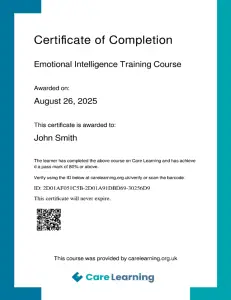Trauma is a response to deeply distressing or threatening experiences that overwhelm an individual’s ability to cope. It can have lasting effects on mental, emotional, and physical wellbeing. For health and social care professionals, understanding trauma—and adopting trauma-informed approaches—is vital to providing safe, compassionate, and effective support.
This free trauma course explores the impact of trauma, the different types and signs to look out for, and the principles of trauma-informed care. It also addresses resilience, coping strategies, and the importance of supporting staff who may experience vicarious trauma in their work.
Why Take This eLearning Course?
Trauma is more common than many people realise, with childhood trauma, abuse, neglect, violence, and bereavement being some of the most significant contributors to long-term difficulties. Professionals in care roles are often the first to encounter trauma survivors, making awareness and sensitivity essential.
Here’s why this course is for you:
- Understand trauma clearly: Learn about the neurobiological effects of trauma on the brain and the difference between acute and chronic trauma.
- Recognise the signs: Identify the psychological, behavioural, and physical effects of trauma in both children and adults.
- Learn trauma-informed practice: Discover how to create safe, respectful environments that prevent re-traumatisation.
- Support recovery: Explore coping strategies, therapies, and ways to build resilience in trauma survivors.
- Protect yourself and colleagues: Understand vicarious trauma, its impact on staff, and how to maintain wellbeing when working in demanding roles.
- Relevant to UK practice: Learn how local policies and legislation underpin trauma-informed approaches.
Learning Outcomes
By the end of this course, you will be able to:
- Define trauma and explain its impact on individuals.
- Differentiate between acute and chronic trauma, and understand how trauma affects the brain.
- Recognise common types of trauma, including childhood trauma, and their effects on health and wellbeing.
- Identify psychological, physical, and behavioural signs of trauma in children and adults.
- Apply the principles of trauma-informed care to create safe environments.
- Support survivors through appropriate communication, signposting, and evidence-based coping strategies.
- Build resilience in individuals and promote strength-based approaches.
- Recognise vicarious trauma in staff and use strategies to reduce secondary traumatic stress.
- Understand UK legislation and policy frameworks related to trauma-informed practice.
Target Audience
This course is designed for:
- Health and social care workers supporting people affected by trauma.
- Carers and support staff who want to provide trauma-sensitive care.
- Teachers, youth workers, and community practitioners.
- Managers and leaders responsible for embedding trauma-informed practice in their teams.
- Students preparing for roles in care, education, or social services.
The course is accessible to beginners but also offers depth for experienced professionals seeking to strengthen their knowledge.
FAQ
What does the course cover?
It covers trauma and its effects, the signs and types of trauma, trauma-informed care, coping strategies, resilience-building, and staff wellbeing.
Can I apply what I learn straight away?
Yes. The course includes practical approaches and scenarios you can apply immediately in care and professional contexts.
How long will it take?
The course is self-paced and typically takes 1 hour to complete.
Will I receive a certificate?
Yes. You’ll receive a certificate upon completion to evidence your learning.
Is this course relevant to UK practice?
Absolutely. It includes references to UK policies, legislation, and best practice frameworks.
Is this course CPD accredited?
Not currently, but CPD accreditation is planned.
Trauma can affect anyone—but with awareness and the right skills, professionals can provide safe, respectful, and effective support. This course equips you to recognise trauma, apply trauma-informed care, and build resilience for both individuals and staff.
Join today and strengthen your understanding of trauma in health and social care.
You must log in and have started this course to submit a review.
Trauma Awareness Training Course CPD Accredited and Government Funding
We’re working on getting this Trauma Awareness Training Course CPD accredited, and any course that’s approved will be clearly labelled as CPD accredited on the site. Not every health and social care course has to be accredited to help you meet CQC expectations – what matters is that staff are competent, confident and properly trained for their roles under Regulation 18. Our courses are built to support those requirements, and because they’re not government funded there are no eligibility checks or ID needed – you can enrol and start learning straight away.



